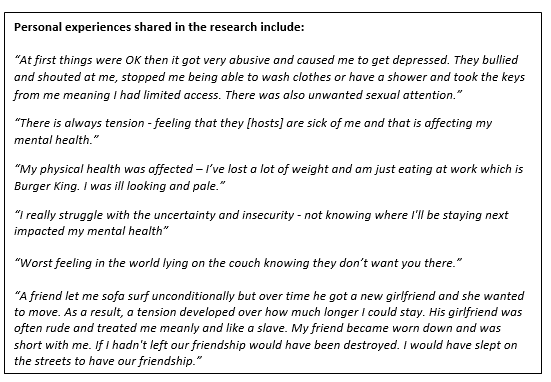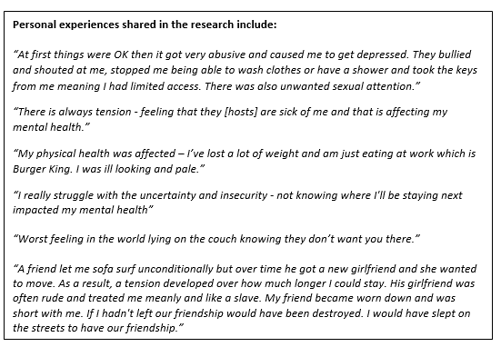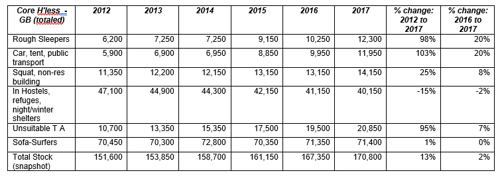Crisis report lifts the lid on the brutal realities of sofa surfing
23.12.2019
New research out today from national homelessness charity Crisis has unearthed shocking findings about the most common yet misunderstood form of homelessness – sofa surfing.1
The report, based on interviews with 114 people who had experienced sofa surfing, shines a light on the horrific effects on a person’s mental and physical health, eroding their relationships and leaving them trapped sleeping on sofas and floors in the long term with no viable way out. The research also reveals the root causes forcing people to sofa surf in the first place.
An overwhelming four-fifths reported a downturn in their mental health because of sofa surfing, many attributing this to the constant pressure of feeling like a burden, tension with their host and insecurity of their living situation. A further three-quarters also told of the debilitating impact sofa surfing had on their physical health, reporting issues like extreme back and neck pain, chronic fatigue and the effects of poor diet with many having no access to cooking facilities.
Sadly, the isolation of sofa-surfing has also been revealed, with three-fifths saying they are seeing their friends and family less. For many this was because they felt ashamed of their living situation and their close relationships fell apart, having overstayed their welcome. Particularly stark instances include mothers who could no longer see their young children.
For most, sofa surfing is not a one-off temporary situation or stepping-stone between homes – with a third having done so for between six months and three years. A large number of people interviewed disclosed that they moved from one experience of sofa surfing straight to another and a significant proportion even went on to rough sleep after their last instance of sofa surfing.2 It can be the beginning or part of long periods of homelessness where people move in and out of different forms, which are often insecure and dangerous. Failing to help people in this situation early on means we are allowing people to sofa surf long term, making it harder to leave behind for good the longer it continues. The constant insecurity can make it even harder for people to move on, as over half of people interviewed told how sofa surfing had negatively affected them searching for and maintaining employment.
*Please note: a summary of all key findings is included in the notes to editor*
The hidden nature of this form of homelessness means that very little is known about sofa surfing, despite it being the most common form of homelessness. Most recent Crisis figures, compiled by Heriot-Watt University, estimate there are over 71,400 families and individuals across Great Britain are forced to stay on friends or family sofas or floors on a short-term basis, as they have nowhere else to go.1


This research has also drilled down into the root causes forcing people to sofa surf in the first place. A key driver for over half was a lack of affordable housing, with nearly two-fifths stating that their housing benefit hadn’t covered the cost of their rent, leaving many with mounting financial pressures and more vulnerable to sofa surfing.
Danielle, 28, from Barrow was forced to sofa surf after leaving her partner who was physically and verbally abusive. Despite going to the police and local council for help after one brutal assault where she was left with a broken nose, Danielle was not deemed a priority for emergency housing as the council stated she had made herself ‘intentionally homeless’ by leaving the tenancy she shared with her partner.
Talking about her time sofa-surfing, Danielle said “When the council refused to help me out, I had no idea what to do. I had no family nearby who I could stay with. One friend let me stay on her bedroom floor for a few weeks while I began to go through the court system to try and get off the tenancy I shared with my ex-partner.
“Another friend then said I could stay on his sofa, but it was only a one bed flat, and it was massively overcrowded.
“He was a nurse, working day and night shifts, and I was still a student in the day while working at a cinema in the evening, so I would often be asleep while he would be trying to eat his breakfast, and vice versa. It was really difficult - even things like getting dressed in private was impossible. Because I was going through a lot of trauma at the time, I was just constantly crying and angry. Having to stay like this ruined our friendship for a while.
“I don’t know what would have happened if he hadn’t put up with me. I’ve thought about it quite a lot, but honestly there was no Plan B.”
This stark insight comes as Crisis today open the doors of its Christmas centres across Great Britain, where the charity is expected to welcome over 4,500 guests over the festive period. The centres provide people experiencing all forms of homelessness, including sofa surfing, access to food, washing facilities and a bed for the night in a warm and comfortable environment. Aside from this immediate shelter, guests are also able to access the support that Crisis offers all year-round including advice on housing, work and benefits, to help them leave homelessness behind for good.
Commenting on the research, Chief Executive of Crisis, Jon Sparkes, said:
“We know homelessness causes untold human suffering. Too many people in our society are facing unbearable pressures, forced to sleep on sofas and floors night after night after night. The harsh reality of sofa surfing is clear to see here - people trapped in this situation with no way out and everyday facing the worry that today could be the day they are asked to leave, with nowhere else to go. None of us should be forced to live this way.
“This research acts as a shameful reminder to the new government that tackling homelessness must be treated as a top priority in the coming months to ensure more people are not forced into this situation. We know homelessness can be ended in the UK - but this will only be made a reality by investing in housing benefit, so it truly covers the cost of rents across the country, and making sure local councils recognise sofa-surfing as a form of homelessness that is eligible for assistance across the board.
“In the meantime, anyone wanting to help can support Crisis, so we can be here this Christmas and all year round for anyone who needs us - whether it be someone sofa surfing, stuck in unsuitable temporary accommodation or forced to sleep on the streets.”
People can support by donating £28.87 to reserve a place for someone experiencing homelessness at one of Crisis’ Christmas centres. Visit www.crisis.org.uk/reserveaplace
- ENDS –
For further comment or to arrange a case study or spokesperson interview, please email media@crisis.org.uk or call 0207 426 3880.
NOTES TO EDITORS
The full report ‘It was like a nightmare’ – the reality of sofa surfing in Britain today is available to read here: https://www.crisis.org.uk/ending-homelessness/homelessness-knowledge-hub/types-of-homelessness/it-was-like-a-nightmare-the-reality-of-sofa-surfing-in-britain-today/
This research was carried out by Crisis on 114 people in 12 locations across England, Scotland and Wales.
Key findings from the report include:
- Of those people currently sofa surfing, a third (33%) had been doing so for between six months and three years
- Almost two fifths (39%) have had to move to five or more different places in the past year alone.
- Over a quarter (28%) had not had a settled home for over four years or more
- Eight out of 10 (80%) said their mental health had suffered as a result of sofa surfing
- Over three-quarters (77%) reported their physical health had deteriorated while sofa surfing.
- Nearly a third (30%) saw friends and family less because they felt ashamed of their situation.
- Over half (56%) said that looking for work, securing or maintaining one was negatively impacted by sofa surfing.
- A quarter (25%) were unable to access any cooking facilities whilst sofa surfing
- Almost a fifth (17%) had no access to a shower or a bath to wash themselves.
- Six out of 10 (61%) did not have the keys to independently access the property
- Over half (54%) stated that issues related to housing affordability were a factor in them starting to sofa surf
- Nearly two fifths (38%) said that their benefits did not cover the cost of rent.
1. Core homeless households in Great Britain 2012 to 2017
Figures on the number of sofa surfing is taken from Crisis’ research by Heriot-Watt University on the number of households experiencing the worst forms of homelessness; ‘core homelessness’. Sofa surfing is the most common form of core homelessness making up 42% of the total [see table below]


2. Routes into and out of sofa surfing
The research shows that people are much less likely to come from secure housing situations into sofa surfing. Unlike previous research, this study highlights that people are more likely to come from other insecure housing situations. For instance, 74 participants (out of 114) had sofa surfed at some stage before going onto sofa surf again. 58 participants sofa surfed after rough sleeping and 49 had slept in cars, van or on public transport before sofa surfing. Housing situations after sofa surfing tend to replicate those preceding it i.e. people move on to just as insecure and vulnerable situations. These findings show that, for many participants sofa surfing had not been a fortuitous stepping stone on – and away – from rough sleeping situations, for example, but rather a perpetuation of already existing insecure (and dangerous) housing trajectories that they struggle to get out of.
About Crisis
Crisis is the national charity for homeless people. We help people directly out of homelessness, and campaign for the social changes needed to solve it altogether. We know that together we can end homelessness.
About Crisis’ Christmas centres
At Crisis our focus is on ending homelessness for good. Last year we published an evidence-based plan showing exactly what it will take to end homelessness across Britain once and for all. But while there are still people in our society without a home, our Christmas centres will continue to be there to provide the vital first steps out of homelessness, alongside our year-round services.
Our Christmas centres are just the beginning of helping people out of homelessness. They also offer hope to people when they need it most. Hope of a better future, where homelessness is a thing of the past.
Alongside our 12,000 volunteers we welcome thousands of guests into Christmas centres across Great Britain offering advice and support with health, housing, employment, benefits as well as food, clothing and company for the festive period.
In 2018, 4,676 guests came to our Christmas centres in London, Birmingham, Coventry, Edinburgh, Swansea, Oxford and Newcastle combined.
Together we will end homelessness – but until that day, we will be there, side by side with the people who need us. To find out more about us, visit our website
